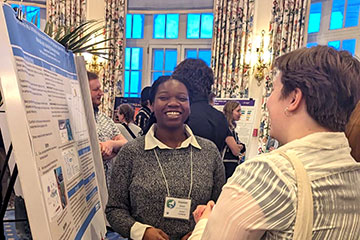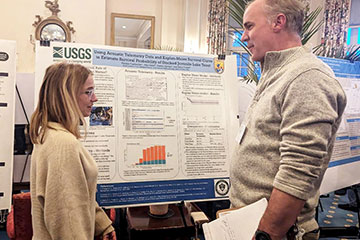
04/15/2024
Three SUNY Cortland students had the chance to show what they’d learned during a summer-long internship that took them from campus to the Great Lakes.
The internships, to help save a key piece of the Great Lakes ecosystem, are a collaboration between the university, SUNY Oswego, the federal Tunison Laboratory of Aquatic Science in Cortland, the Lake Ontario Biological Station in Oswego and other agencies and organizations.
It's all part of the United States Geological Survey’s (USGS) Coregonine Restoration Framework — a plan endorsed in 2018 by fishery managers representing eight U.S. states, three U.S. intertribal organizations and the Canadian province of Ontario. It seeks to restore and conserve the coregonine subfamily of freshwater fish, including whitefish like trout, found in the Great Lakes.
Coregonine fish species were once harvested at commercial fisheries and still serve as part of the food chain for other commercial fish, making them vital for both a healthy ecosystem and economy. Great Lakes fisheries are worth $7 billion and support over 75,000 jobs annually, according to project leader and SUNY Oswego biological sciences faculty member Nicholas Sard.
Cortland students Kayelah Brown, Morgan Bulger and Preston Fuerbacher joined with two SUNY Oswego students to reveal their research results at the New York Chapter of American Fisheries Society’s annual meeting from Feb. 6 to 8 in Cooperstown, N.Y.
Each intern picked a project to work on during the summer. Research was done through the Tunison Lab of Aquatic Sciences and Oswego’s Lab of Biological Sciences.
“Presentation of their research at a scientific meeting is the culmination of the students’ hard work over the summer and into the fall semester,” said Mary Beth Voltura, associate professor of biological sciences. “The meeting provides a wonderful opportunity to network with experts in the field of fisheries biology.”
The chance to present their findings and connect with professionals was a valuable tool for their future, according to junior Preston Fuerbacher, a conservation biology major from Fairport, N.Y.
“The presentation aspect was the best experience,” she said. “I stood in front of my poster and talked to anyone who was interested in my project.”

Fuerbacher met people in the New York State Department of Environmental Conservation (DEC) and in Ph.D. programs, and fishery managers.
“All were helpful in giving advice and outlooks into this career”
Fuerbacher focused on running previously collected data through a computer program to predict survival rates of stocked lake trout. She said she enjoyed learning how a research project works, and that it expanded on what she learned during labs in her regular classes.
“It was great, as I got to learn all about the different aspects of acoustic telemetry. I helped surgically tag fish, I went out on the lake and changed batteries in the transmitters, and I got to learn the analysis side of it.”
The focus of sophomore biology major Morgan Bulger of Burt, N.Y., was walleye spawning in the Black River.
“The fieldwork happened at night, so we left the lab around 4 (p.m.) to head out to the Black River,” she said. “We did a lot of sampling and towed up the Three River sections. We didn’t arrive back at the lab until 1 in the morning. This is only my second time going out in the field during the summer. I learned so much about what conducting research in the field was like.”
Bulger said that her presentation went well and that she had a great time connecting with other students and knowledgeable professionals. She always knew she wanted to have a fish-related career after graduation, but now has a clearer idea of what that will be.
“I particularly loved the restoration that many of these places do, not only in the lab but also in the field. I want to improve the world, and this experience has shaped that for me,” Bulger said.
SUNY Cortland’s Li Jin, professor in the Geology Department and coordinator of its Environmental Science Program, noted that these types of internships are a big advantage for students, and that similar positions are available to applicants.
“Conducting research and presenting research findings at professional conferences as an undergraduate student is not common,” Jin said. “At Cortland, we strongly encourage these types of experiences as they significantly contribute to students’ academic growth by transforming their educational experience.”
She added that she hoped experiences like this would help shape the students into advocates for environmental conservation and future leaders in the field.
“We’re grateful for the opportunities provided by this USGS-funded project for our Cortland students,” Jin said. “It has offered them exceptional opportunities to learn from outstanding research scientists and experts through conducting field and laboratory work, and to make meaningful contribution to ongoing fish conservation and restoration efforts in the Great Lakes.”
Voltura and Jin have just finished reviewing the latest round of applications and are in the process of awarding new internships. They said they are excited to welcome a second cohort of students to join them this summer and look forward to working with faculty and researchers from SUNY Oswego and USGS.